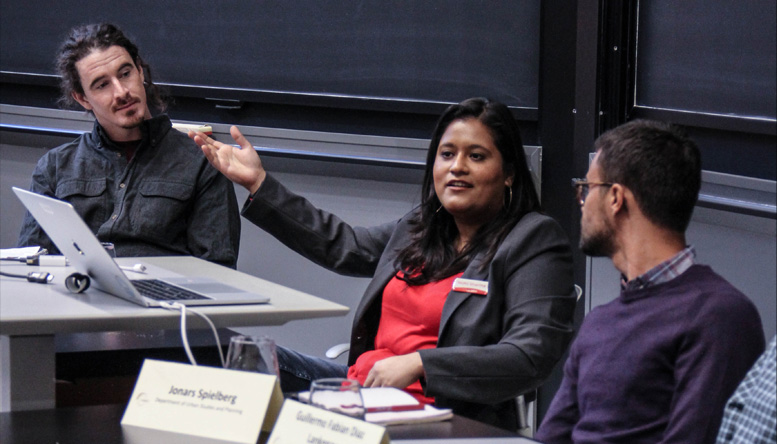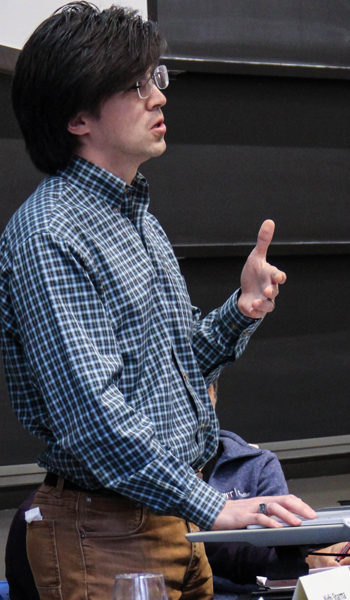News MIT Researchers on Tech for Smallholder Farmers: Using Socially Conscious Innovation to Foster Resilience
Archana Apte, Communications and Project Assistant Abdul Latif Jameel Water and Food Systems Lab February 12, 2019

Michael Arnold, PhD candidate in the Department of Mechanical Engineering and panel moderator (left), Nidhi Sharma, graduate fellow in the MIT Integrated Design and Management program (center), and Jonars Spielberg, PhD candidate in the Department of Urban Studies and Planning (right) Photo credit: Andi Sutton, J-WAFS
“We had to throw away our expectations about what a tractor should be and instead focus on user needs,” explained Guillermo Lankenau, one of the panelists at the seminar hosted by J-WAFS at MIT on February 8th. The event, Smallholder Farming: Strategies for Sustainability and Resilience, brought together MIT researchers studying a variety of food and water issues that affect rural farmers, especially in the Global South. The event drew a crowd interested in the intersection of technology and social issues as they relate to farming practices.
Lankenau, a PhD candidate in the Department of Mechanical Engineering, was one of four researchers featured at the event. He shared the background and history of tractor design that informs his current research to develop a new tractor that could more effectively suit the needs of smallholder farmers in rural areas in India. For Lankenau, the design challenge was as much a social and lifestyle issue as it was an engineering problem. The need to situate technology adoption into social context was echoed by other researchers studying a variety of food and water issues.

Guillermo Fabian Diaz Lakenau, PhD candidate in the Department of Mechanical Engineering. Photo credit: Andi Sutton, J-WAFS
Two of the panelists found that they didn’t need to develop technology for the farmers themselves in order to have an impact. Nidhi Sharma, a graduate fellow in the Integrated Design and Management program, is focusing her research on unwanted moisture absorption in stored grains. Sharma explained that excessive moisture in grain storage promotes the growth of cancer-causing fungi, presenting a public health issue and lost revenue for governments. Sharma developed a RFID tag that warehouse workers can use to track humidity in their grains, and is also focused on Indian markets. “It’s not necessary to develop technology that directly affects the farmer,” explained Sharma. In some cases, addressing an issue farther up the distribution chain can be a more efficient means of addressing it.
That idea was echoed by Sorin Grama, Entrepreneur-in-Residence at the MIT Martin Trust Center and instructor at MIT D-Lab, who developed a thermal chiller to help Indian dairy farmers store milk in their villages before its collection by dairy processors. The dairy processors brought the challenge of milk spoilage early in the supply chain to Grama and other research team members. Once the system was developed and ready for market, they purchased them and the technology is now proving to be an essential support. “The ultimate beneficiaries of this are the farmers,” noted Grama, who make daily profit from their dairy export now that the distributors have a mechanism to preserve its freshness.
Addressing smallholder farmers’ issues within a social and economic context was key for other presenters, as well. Lankenau found that modern tractors were not suited for the small fields and rugged terrain of the smallholder farmers his team interviewed. The machinery is also too expensive for farmers to purchase and maintain, which leaves many farmers without the time-saving contributions that tractors make for farming. Jonars Spielberg, PhD candidate in the Department of Urban Studies and Planning, presented early results of a research project being developed through MIT D-Lab and CITE. The project, Assessment of Opportunities for Use of Digital Financial Services for Smallholder Farmers, is investigating the adoption of digital financial services, such as digital money transfers and insurance, by smallholder farmers in Guatemala and Senegal. Just as Guillermo had found, the farmers in Spielberg’s interviews already knew of these tools’ benefits, so it wasn't lack of knowledge that limited uptake. Instead, he presented elements in a complex web of social and economic factors that discourage many farmers in these countries from the use of digital financial tools. This research project seeks to understand these social and economic factors in order to develop a system that can overcome them to bring improved digital financial services to rural farmers.
The researchers’ emphasis on social context was reinforced by comments made during the event’s lively Q&A session. Reflecting on climate change in particular, Sharma noted that some farmers she visited in India did not know what to grow in the face of changing temperatures and weather patterns, adding that the seed stock in government warehouses is at times outdated and unsuited to changing climates. Sharing new knowledge could help. Reflecting on social contexts that supported the success of his business in India, Grama stated that understanding the symbiotic relationship between the dairy farmers and processors was crucial to the success of his team’s dairy chillers. What was clear across all questions posed to the panelists, and their answers, is that as issues of food and water systems grow increasingly complex, thoughtful analysis of problem spaces and the unpacking of social and economic context will prove invaluable.